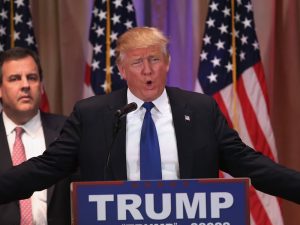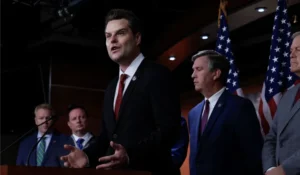Trump and Clinton Score Big On Super Tuesday

For the past few decades, both the Democratic and Republican Parties have chosen a date in the early part of a presidential election year where multiple states hold concurrent elections for the party nominee. “Super Tuesday”, as this date has come to be known lived up to its billing this year as 13 different states held primaries or caucuses for the Republican and Democratic nominations on March 1st. The idea behind holding all these contests is to winnow down the field of candidates and give one front-runner in each party a substantial delegate lead that will effectively lead to their nomination. In a crazy election year like 2016, however, this was not the case as even though Donald Trump and Hillary Clinton won most of their parties primaries, their path to nomination remains uncertain as they face increased challenges from other emboldened candidates.
The Donald Trump saga continued into Super Tuesday as many expected, with the brash New York businessmen winning a majority of the states and delegates up for grabs this night. Trump held a surprisingly well-tempered press conference after a string of seven victories, where he reiterated his pledge to “make American great again” and seemingly began to look ahead to the general election when he vowed to make the GOP “more unified and inclusive.” He even congratulated rival Ted Cruz, who has often sparred with Trump, for his victories. The Texas senator outperformed expectations on Tuesday, winning not just his delegate-rich home state of Texas, but also Oklahoma and Alaska. It was not all civility for Trump however, as he couldn’t resist taking a few swipes at Marco Rubio who, after ramping up attacks against Trump, only managed to win one state, Minnesota. Rubio shot back calling Trump a “con-artist” and vowing once again to stay in the race as long as it takes to defeat him. Ted Cruz offered a different strategy for countering Trump in his speech, calling on his challengers to “prayerfully consider” dropping out so the anti-Trump vote can consolidate around the Cruz campaign. When all was said and done, Trump emerged with 243 delegates won, Cruz with 220 and Rubio with 101.
The big winner of the night on the Democratic side was Hillary Clinton. The former first lady and Secretary of State won eight of the twelve states holding elections for the Democrats. Clinton dominated in the South, riding her popularity with African American voters to wins in Georgia, Texas, Arkansas, Tennessee and Virgina. In her victory speech, the Democratic front-runner thanked her supporters and urged them to keep volurntering to help her capaign and to further her goal of “making America whole again.” Her victories Tuesday night gave her an additional 318 delegates compared to the 124 that rival Bernie Sanders racked up. Sanders came away with small victories including his home state of Vermont. The 74-year-old senator vowed to continue his campaign, saying that,”thirty-five states remain and let me assure you that we are going to take our fight for economic justice, for social justice, for environmental justice, for a world of peace, to every one of these states.”
Even after all the excitement and action that occurred on Super Tuesday, the race for both parties nominations appears to have remained unchanged. Both Trump and Clinton remain the front-runners of their party, with rivals Ted Cruz , Marco Rubio and Bernie Sanders lagging behind. The race on both sides still has a long ways to go, as both trump and Clinton are far off from attaining the 1237 and 2383 delegates needed to win their parties nominations, respectively. 2012 presidential candidate Mitt Romney intensified the Republican struggle on Thursday, asking Republicans to “strategical vote against Trump” by supporting the best performing alternative candidate in their state. His recommendation seemed to assert that the Republican establishment was launching an effort to deprive Trump of the delegates needed for an outright win in hopes of creating a brokered convention where the non-Trump delegates could be given to one candidate who would then assume the parties nomination. Whatever the case may be, Americans hoping for an end to the fiery, tumultuous primary season should sit back and take a deep breath because the end is still nowhere in sight for either party.








